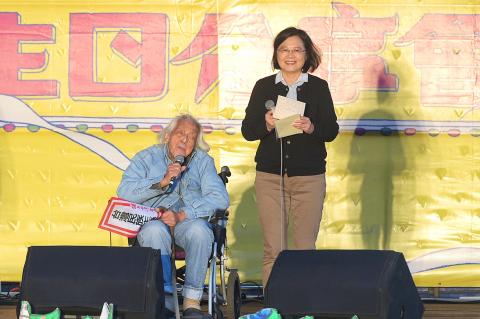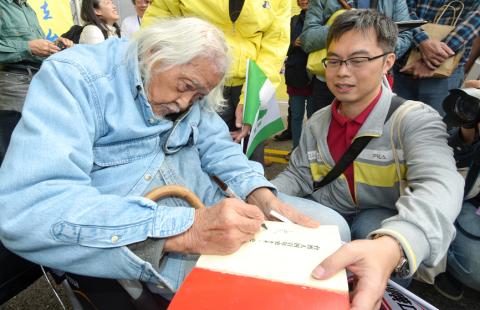Hundreds of people yesterday joined an early celebration in Taipei for Taiwanese independence pioneer Su Beng’s (史明) 100th birthday, while Su urged President Tsai Ing-wen (蔡英文) to ensure that Taiwanese could become the master of their own nation.
The block party on Ketagalan Boulevard was organized by dozens of pro-independence groups, musicians, performers and publishers, which featured performances, speeches and a book fair.
Tsai made a brief appearance at about 5pm, joining Su on stage to give him a hug and some gifts.

Photo: Chang Chia-ming, Taipei Times
She read a birthday card she had written to him: “I am thankful that you have proven to Taiwanese with your life that people can earn dignity if they persist with their dreams.”
Su, a vocal supporter of Tsai during her presidential campaign, thanked her and other participants, saying that although he rarely celebrated birthdays in the decades after he left Taiwan at age 20, he felt blessed by the birthday wishes of fellow independence advocates.
Life is “worth living” with a lifelong commitment to Taiwan and its people, he said, adding that he had achieved little over his decades of activism.

Photo: Chang Chia-ming, Taipei Times
Su asked Tsai to lead her administration in line with public opinion to achieve the goal of “making Taiwanese their own master,” adding that this is an optimal time to achieve independence.
“The world has changed greatly. We need to be more hard-working to understand the public while working in line with public opinion,” Su said.
“President Tsai Ing-wen can hopefully put forward policies that can correspond to global trends and satisfy the need of Taiwanese,” he said.
“The train of progress has started. This is the first time that Taiwan has had a female president in its 400-year history. The nation has to do the right thing and be united and persistent while preventing the Chinese Nationalist Party [KMT] from regaining power to become a leading nation on equal footing with other nations,” he said.
Tsai’s efforts alone cannot achieve the goal; it requires everyone’s commitment, he said.
Su, whose given name is Shih Chao-hui (施朝暉), was born in Taipei on Nov. 9, 1918. According to the traditional Chinese way of counting birthdays, that makes him 100 years old.
He left Taiwan to study at Japan’s Waseda University.
After graduating in 1942, he went to China, where he worked undercover as part of the Chinese Communist Party’s anti-Japanese efforts, but eventually grew dissatisfied with the party.
He returned to Taiwan in 1949, where he founded the Taiwan Independence Association a year later.
He attempted to organize an armed resistance against the KMT, but was forced into hiding in 1951. He escaped by boat to Japan in May 1952, but was arrested and served time for illegally entry,
However, after the KMT announced he was wanted in connection with a plot to assassinate Chiang Kai-shek (蔣介石), Japan gave him political asylum and he lived there in exile until 1993, when he snuck back into Taiwan by boat.
He has advocated Taiwanese nationalism as a foundation to abolish the Republic of China framework.
His 1962 book, Taiwan’s 400 Year History, is considered a landmark work of the independence movement.

MAKING WAVES: China’s maritime militia could become a nontraditional threat in war, clogging up shipping lanes to prevent US or Japanese intervention, a report said About 1,900 Chinese ships flying flags of convenience and fishing vessels that participated in China’s military exercises around Taiwan last month and in January last year have been listed for monitoring, Coast Guard Administration (CGA) Deputy Director-General Hsieh Ching-chin (謝慶欽) said yesterday. Following amendments to the Commercial Port Act (商港法) and the Law of Ships (船舶法) last month, the CGA can designate possible berthing areas or deny ports of call for vessels suspected of loitering around areas where undersea cables can be accessed, Oceans Affairs Council Minister Kuan Bi-ling (管碧玲) said. The list of suspected ships, originally 300, had risen to about

DAREDEVIL: Honnold said it had always been a dream of his to climb Taipei 101, while a Netflix producer said the skyscraper was ‘a real icon of this country’ US climber Alex Honnold yesterday took on Taiwan’s tallest building, becoming the first person to scale Taipei 101 without a rope, harness or safety net. Hundreds of spectators gathered at the base of the 101-story skyscraper to watch Honnold, 40, embark on his daredevil feat, which was also broadcast live on Netflix. Dressed in a red T-shirt and yellow custom-made climbing shoes, Honnold swiftly moved up the southeast face of the glass and steel building. At one point, he stepped onto a platform midway up to wave down at fans and onlookers who were taking photos. People watching from inside

Japan’s strategic alliance with the US would collapse if Tokyo were to turn away from a conflict in Taiwan, Japanese Prime Minister Sanae Takaichi said yesterday, but distanced herself from previous comments that suggested a possible military response in such an event. Takaichi expressed her latest views on a nationally broadcast TV program late on Monday, where an opposition party leader criticized her for igniting tensions with China with the earlier remarks. Ties between Japan and China have sunk to the worst level in years after Takaichi said in November that a hypothetical Chinese attack on Taiwan could bring about a Japanese

STREAMLINED: The dedicated funding would allow the US to transfer equipment to Taiwan when needed and order upgraded replacements for stockpiles, a source said The US House of Representatives on Thursday passed a defense appropriations bill totaling US$838.7 billion, of which US$1 billion is to be allocated to reinforcing security cooperation with Taiwan and US$150 million to replace defense articles provided to the nation. These are part of the Consolidated Appropriation Act, which the US House yesterday passed with 341 votes in favor and 88 against. The act must be passed by the US Senate before Friday next week to avoid another government shutdown. The US House Committee on Appropriations on Monday unveiled the act, saying that it allocates US$1 billion for the Taiwan Security Cooperation Initiative